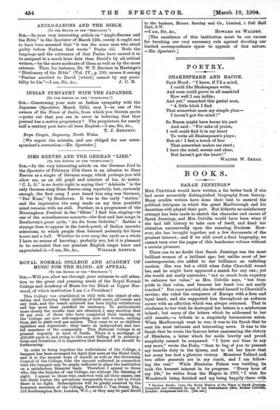ROYAL NORMAL COLLEGE AND ACADEMY OF MUSIC FOR THE BLIND:
AN APPEAL. [To THE EDITOR OF THE " SPECTATOR."1 SIE,—Will you allow me through your columns to call atten- tion to the great and pressing needs of the Royal Normal College and Academy of Music for the Blind at Upper Nor- wood, of which institution I am .tle President ?
This College was established in 1872 with the object of edu- cating and training blind children of both sexes, all creeds and any rank, and the result achieved has been highly satisfactory and has more than justified its existence. To particularise more closely the results that are obtained, I may mention that 89 per cent. of those who have completed their training at the College are now self-supporting men and women, earning from £60 to £400 each per annum. They come to us as children sightless and dependent ; they leave us independent and use- ful members of the community. This National College is at present urgently in need of funds. There is a mortgage of .£15,000 upon it, and owing to the recent falling off in subscrip- tions and donations, it is imperative that financial aid should be forthooming.
In order to bring together the wellwishers of the College, a banquet has been arranged for April 21st next at the Hotel Cecil, and it is the earnest hope of myself, as well as the Governing Council of the College, that the amount collected in connection with the banquet may be amply sufficient to place the institution on a satisfactory financial basis. Therefore I appeal to those who, like the founder of our College, are without the blessing of sight. I appeal to those who, endowed with all their senses, can but dimly realise the privations inseparable from a life in which there is no light. Subscriptions will be gLtdly received by the honorary secretary of the College, Frederick C. Van Diner, Esq., 114 Southampton Row, London, W.C.; or they may be paid direct
to the bankers, Messrs. Barclay and Co., Limited, 1 Pall Mall East, S.W.
[The excellence of this institution must be our excuse for breaking our very necessary rule against devoting our limited correspondence space to appeals of this nature. —ED. Spectator.]










































 Previous page
Previous page